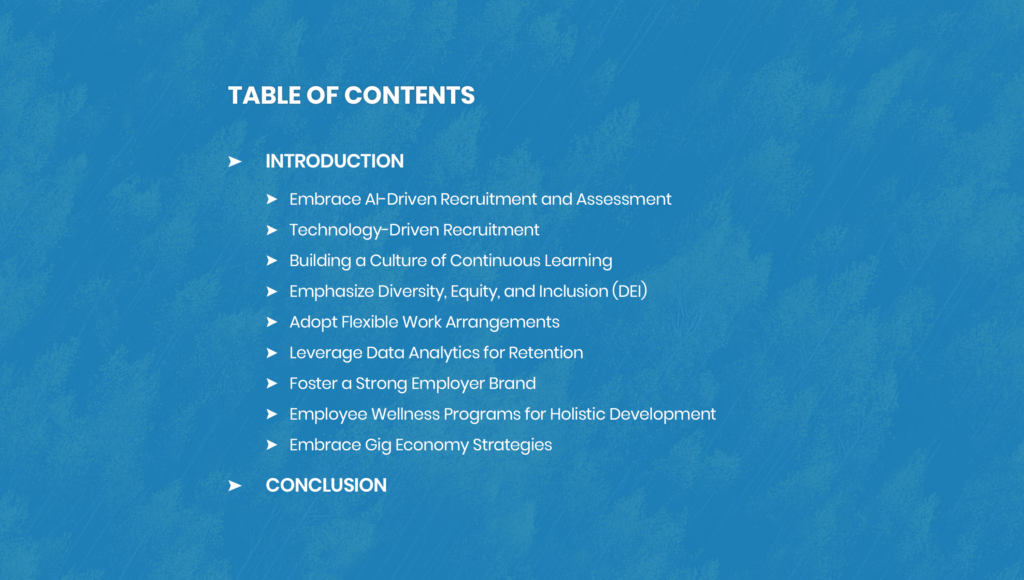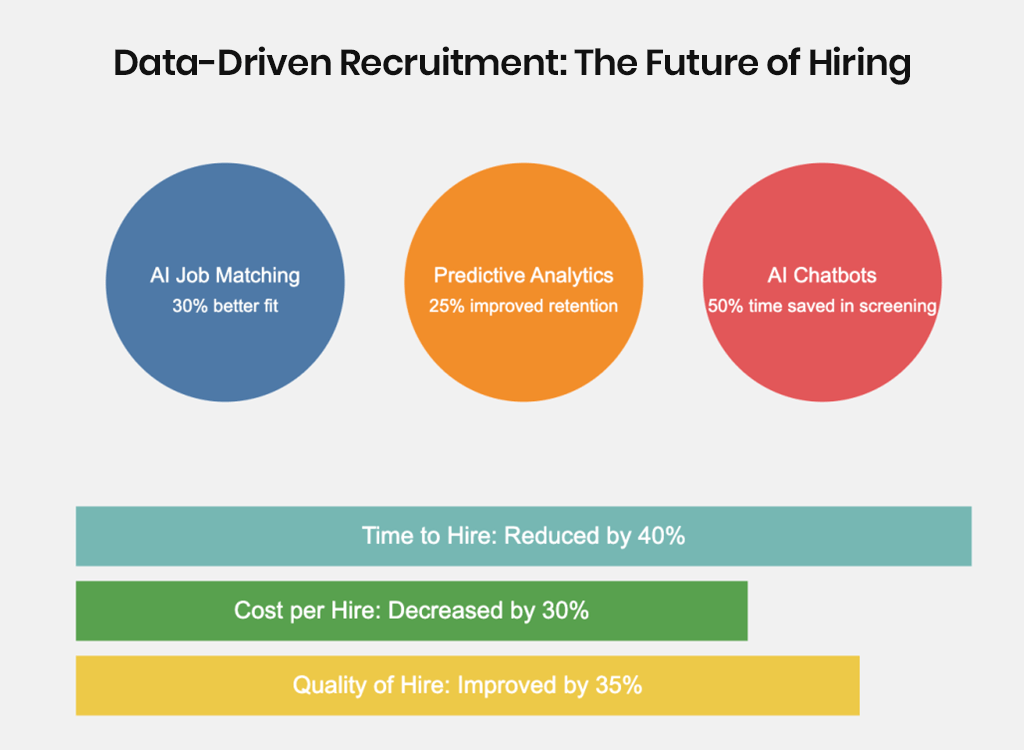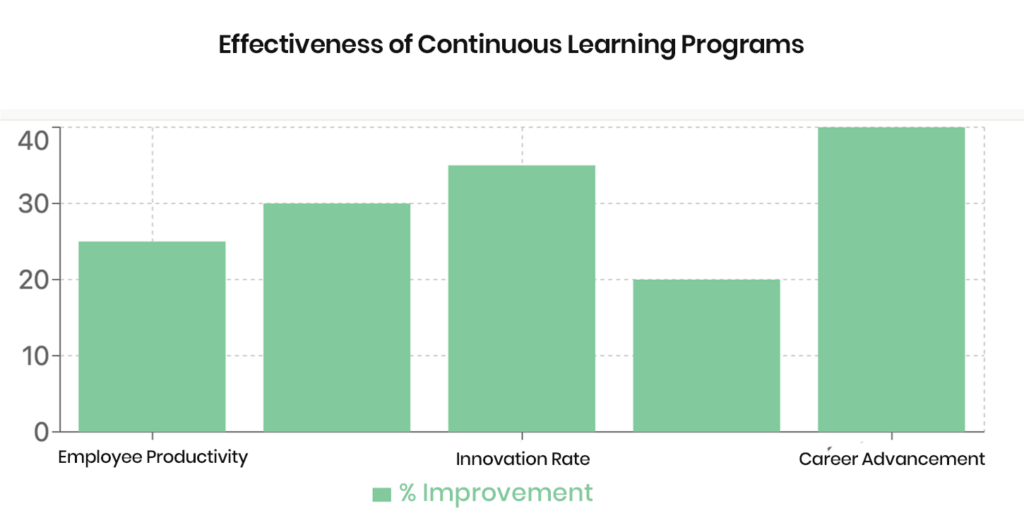In today’s rapidly evolving business landscape, the ability to attract, develop, and retain top talent has become a critical factor in organizational success. As we navigate the complexities of the 21st century, traditional approaches to talent management are no longer sufficient. This blog post explores innovative tactics that forward-thinking companies are employing to excel in talent management and stay ahead of the curve.

1. Embrace AI-Driven Recruitment and Assessment
Artificial Intelligence (AI) is revolutionizing the recruitment process, allowing companies to identify and attract the best candidates more efficiently than ever before.
- AI-powered job matching: Utilize machine learning algorithms to match job requirements with candidate profiles, ensuring a better fit from the start.
- Predictive analytics: Leverage data to forecast a candidate’s potential performance and cultural fit within the organization.
- Chatbots for initial screening: Implement AI-driven chatbots to handle initial candidate inquiries and basic screening, freeing up HR professionals for more strategic tasks.

2. Technology-Driven Recruitment
Automation and AI are rapidly transforming the recruitment process, making it more efficient and accurate.
- AI-powered recruitment tools: These tools can scan resumes, screen candidates, and match them to job roles faster and more efficiently than human recruiters.
- Video interviewing platforms: Instead of traditional face-to-face interviews, companies are increasingly using asynchronous video interviews to assess candidates’ soft skills and cultural fit.
- Gamification in recruitment: Some companies are incorporating gamification to make the hiring process more engaging while assessing cognitive and behavioral traits in candidates.
3. Building a Culture of Continuous Learning
The rapid pace of technological change means that employees need continuous learning opportunities to stay ahead of the curve. Organizations that foster a culture of lifelong learning will have a more innovative and adaptable workforce.
- Microlearning and e-learning platforms: Short, focused training sessions can help employees develop specific skills on-demand.
- Mentorship and coaching programs: Encouraging knowledge sharing and hands-on learning can accelerate employee growth.
- Upskilling and reskilling: Offering courses that enhance employees’ current skillsets or allow them to transition to new roles is vital for career development and job satisfaction.

4. Emphasize Diversity, Equity, and Inclusion (DEI)
In the 21st century, companies can no longer afford to overlook diversity, equity, and inclusion (DEI) as essential components of talent management. DEI initiatives have been proven to improve creativity, innovation, and problem-solving by fostering diverse perspectives.
- Diverse hiring practices: Incorporating blind recruitment, focusing on gender parity, and recruiting from underrepresented groups help build more inclusive teams.
- Inclusive leadership training: Organizations should invest in leadership training to ensure that managers can lead diverse teams effectively.
- Creating safe spaces: Encourage open dialogues and create platforms where employees can voice their concerns and ideas without fear of judgment.
5. Adopt Flexible Work Arrangements
The pandemic has accelerated the shift towards remote and hybrid work models, and top talent now expects flexibility in where and how they work.
- Results-oriented work environment (ROWE): Focus on outcomes rather than hours worked, allowing employees to manage their own time and work style.
- Hot desking and activity-based working: Design office spaces that support various work modes and collaborative needs.
- Digital nomad programs: Offer opportunities for employees to work from anywhere in the world, even if just for short periods.

6. Leverage Data Analytics for Retention
Use the power of data to identify flight risks and implement targeted retention strategies.
- Predictive attrition models: Develop algorithms that can forecast which employees are likely to leave based on various factors.
- Sentiment analysis: Use natural language processing to analyze employee feedback and gauge overall satisfaction levels.
- Real-time feedback systems: Implement tools that allow for continuous feedback rather than relying solely on annual performance reviews.
7. Foster a Strong Employer Brand
In a competitive job market, a compelling employer brand can be the difference between attracting top talent and settling for second best.
- Employee advocacy programs: Encourage and empower employees to share their positive experiences on social media and professional networks.
- Authentic storytelling: Share real stories of employee growth, impact, and satisfaction through various media channels.
- Transparency in company culture: Be open about your company’s values, mission, and day-to-day work life to attract candidates who align with your culture.
8. Employee Wellness Programs for Holistic Development
The focus on mental, emotional, and physical well-being has become crucial to talent management. Companies that prioritize employee wellness often see higher levels of engagement, satisfaction, and retention.
- Wellness incentives: Companies are introducing fitness challenges, mental health days, and wellness stipends to encourage employees to take care of their health.
- Workplace mental health support: Offering counseling, mindfulness programs, and workshops can help employees manage stress and avoid burnout.
- Financial well-being programs: Financial wellness programs, such as retirement planning, can alleviate the stress associated with personal finances.
9. Embrace Gig Economy Strategies
The rise of the gig economy offers new opportunities for talent management.
- Internal gig marketplaces: Create platforms where employees can take on short-term projects across different departments, fostering skill development and cross-functional collaboration.
- Freelancer integration: Develop strategies to effectively integrate freelancers and contract workers into your teams and culture.
- Alumni networks: Maintain strong relationships with former employees, creating a talent pool for future needs or project-based work.
Conclusion
Exceptional talent management in the 21st century requires a multifaceted approach that leverages technology, embraces flexibility, and prioritizes employee well-being and growth. By implementing these innovative tactics, organizations can create a dynamic and engaging work environment that attracts, develops, and retains top talent, driving success in an increasingly competitive business landscape.
Remember, the key to effective talent management lies in continuous adaptation and a willingness to experiment with new approaches. Stay curious, remain open to feedback, and always keep the needs and aspirations of your workforce at the forefront of your talent management strategies.

